Mouth Cancer Signs, Symptoms & Causes
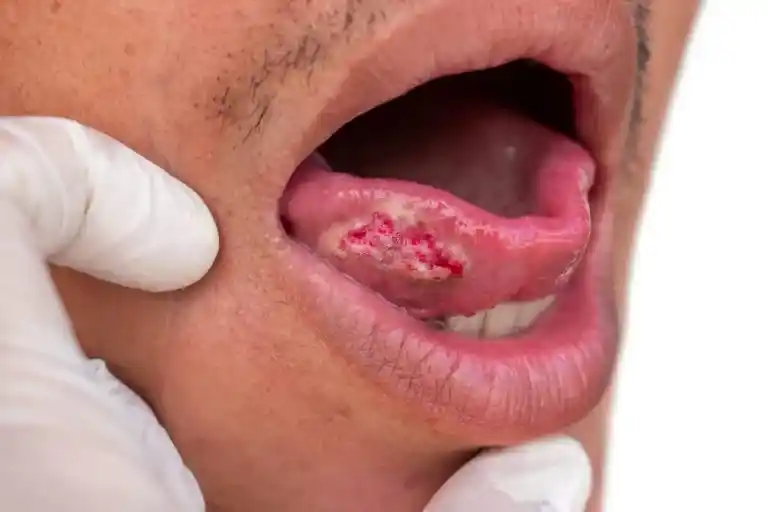
When cancer begins in the oral region or mouth, it is referred to as mouth cancer, cancer of the oral cavity, or oral cancer. A tumour or uncontrolled growth usually develops as a result of aberrant cells growing out of control. It can be a very aggressive kind of cancer. Due to the possibility that there may be no pain or signs, the cancer may not be discovered until it advances to the later stages. Squamous cell carcinomas are the most common kind of mouth cancer, indicating that they begin in the cells that form the mouth lining. Signs and Symptoms of Mouth Cancer It might be challenging to recognise the early mouth cancer symptoms, which makes them sometimes easily missed. Lips, the inner cheek lining, gums, salivary glands, the soft palate, the tongue, and the hard palate are just a few areas where this form of cancer can manifest. There may be a number of mouth cancer symptoms depending on where in the mouth the cancer initially appears. Many dentists do a quick oral cancer screening as part of a regular dental checkup due to their constant concern for their patient’s oral health. This is an additional reason to visit the dentist regularly, in addition to maintaining the health of the teeth and gums. It is important to be aware of the initial mouth cancer signs in order to be able to report them to a doctor as soon as possible. It is generally recommended to seek medical advice for any signs and symptoms of mouth cancer that persist for a period of more than two weeks, including: What Causes Mouth Cancer? Although the precise mouth cancer causes are unknown, there are a number of things that might raise the risk, such as Human Papillomavirus (HPV) infection, cigarette usage, and alcohol intake. The chance of acquiring oral cancer may be impacted by a number of variables. Although the likelihood of developing mouth cancer rises with age, the condition can strike persons as young as 55. Mouth cancer occurs in men twice as often as it does in women. Below are some of the most prevalent mouth cancer causes that increase the chance of getting mouth cancer. Conclusion Mouth cancer is a prevalent form of cancer that is becoming increasingly prevalent in many areas of the world, with new cases occurring regularly. However, with the development of modern medical technology, increased experience, and novel treatments, the survival rate of patients with oral cancer has been steadily improving. Routine mouth cancer screenings and dental checkups might improve the chances of early detection. It’s critical to get medical advice from an experienced doctor for an accurate assessment and diagnosis if you detect any persistent mouth cancer signs or risk factors. FAQs on Mouth Cancer Q. Why should I choose Wockhardt Hospitals for mouth cancer treatment? At Wockhardt Hospitals, we have a dedicated team of cancer specialists with extensive experience in diagnosing and treating virtually all forms of cancer. Our mission is to provide individuals with the most suitable mouth cancer treatment while minimising the risk of complications. Q.What are some less common regions where mouth cancers may develop? There are additional, far less prevalent varieties of mouth cancers, which can occur in regions such as: Lips and tongue Gums The inner lining of the cheek The floor of the mouth Hard and soft palate Q.What should I do if I find any abnormalities in the mouth? It’s crucial to contact a dentist or doctor right away if there are any abnormalities in the mouth since mouth cancer can be treated effectively if found in its early stages.
Mouth Cancer Diagnosis, Treatment & Surgery
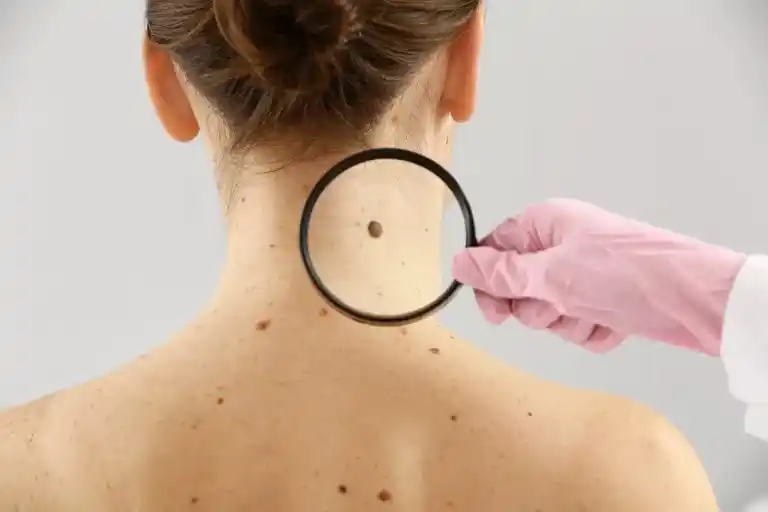
Mouth cancer is an umbrella term for any type of cancer that develops in any of the parts of the mouth. It is also commonly referred to as oral cancer or oral cavity cancer. Lips, tongue, gums, roof of the mouth, tonsils, salivary glands, floor of the mouth, and internal lining of the cheeks can develop oral cancer for varied reasons. Oral cancer is considered the most common type of head and neck cancer, which originates in the mouth but can reach different parts of the head and neck. Prompt diagnosis of the condition and suitable treatment are necessary to curb the progression of this condition. How is Mouth Cancer Diagnosed? Typically, a dentist or ENT specialist can recognise signs of mouth cancer during a routine examination. A comprehensive diagnostic approach is further employed to confirm the diagnosis, and check for other necessary aspects, such as the stage of the cancer, what may have caused the cancer, and other underlying conditions. The standard diagnostic approach for mouth cancer diagnosis involves: Mouth Cancer Treatment A comprehensive and personalised treatment plan is chalked after a thorough diagnostic assessment of the patient. The treatment for mouth cancer relies upon the revelations of the diagnostic tests. Mouth cancer can be treated using different methods, depending on the stage of the cancer. There are 4 stages of mouth cancer, with stage 1 being the earliest and stage 4 being the final stage. Oral cancer treatment may consist of a single treatment or a combination of different methods, depending on the requirement of the specific case. Common mouth cancer treatment methods include: Conclusion Anyone present with signs and symptoms of oral cancer must seek immediate medical intervention for prompt diagnosis and relevant treatment. At Wockhardt Hospitals, we provide all-round care to patients suffering from any form of cancer. We have some of the most brilliant oncologists in our panel, with extensive experience and expertise in providing top-notch care for even the most complex cases of oral cancer, including the best oral cancer treatment in India. They leverage advanced medical technology to offer the best solutions. To consult with our doctors, you can reach out to our team and schedule your appointment right away. FAQs on Mouth Cancer Treatment in India Q. What are the causes of Mouth Cancer? Uncontrolled tobacco use and alcohol consumption are considered the leading causes of oral cancer. Certain other factors, however, can also make a person more susceptible to developing mouth cancer. Besides these, certain other factors can also increase a person’s risk of developing oral cancer. Q. What are the serious risk factors for Mouth Cancer? Infections such as the human papillomavirus (HPV) and Epstein-Barr virus (EBV), a family history of oral cancers, gum diseases, poor oral hygiene, and consuming betel nut or areca, are also considered serious risk factors for mouth cancer. Oral cancer is generally triggered by poor lifestyle habits. Therefore, it is important to understand the risk factors for this condition and adopt healthy habits. Q.What are some common signs & symptoms of Mouth Cancer? Mouth cancer or oral cancer can exhibit a range of symptoms. These symptoms can be similar to those of other benign oral conditions. Listed below are some common signs and symptoms of oral cancer: White or red patches inside the mouth. Bleeding sores on the lips or within the mouth that have not been healing or have been there for a while (more than two weeks). Recurrent, unexplained bleeding in the mouth. Dryness and roughness in the lips, gums, and internal structures of the mouth. Difficulty in chewing, swallowing, speaking, or moving your jaw or tongue. A sense of pain, tenderness, or numbness in the mouth. This may also spread to the face and neck with no visible cause. A noticeable and unintentional weight loss, or feeling of weakness throughout. A bad breath, and earaches.
Blood Cancer Signs, Symptoms & Causes
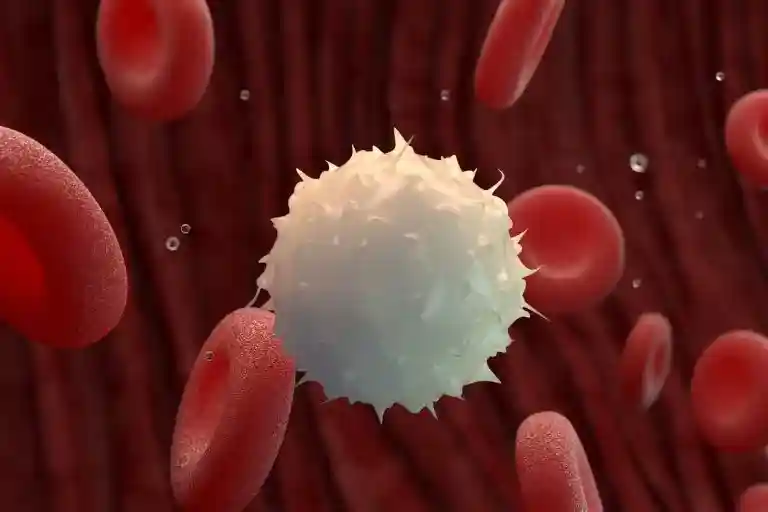
Blood cell formation and function are both impacted by blood cancers. The majority of the time, blood cancer starts in the body’s bone marrow responsible for the production of blood. Stem cells, produced in the bone marrow, eventually develop into RBCs (red blood cells), WBCs (white blood cells), & platelets. Normal blood cells are in charge of preventing infections, supplying oxygen to every part of the body, and controlling bleeding. However, in the case of blood cancer, an aberrant form of blood cell grows uncontrollably in the majority of medical complications, disrupting the process of normal blood cell development. As a result, these cancerous or aberrant blood cells overwhelm the healthy blood cells, causing several kinds of symptoms and medical problems. Types of Blood Cancers Blood cancers often fall into one of three types: Signs and Symptoms of Blood Cancer Blood cancer symptoms differ depending on the kind, although there are several blood cancer symptoms that are present in all three types: If there are any indications or signs of blood cancer that don’t go away, schedule a visit with the doctor. What Causes Blood Cancer? Blood Cancer occurs when the DNA of growing blood cells, primarily white blood cells, is damaged. The blood cells then expand and divide in an irrational manner. Healthy blood cells typically expire after some time and are replaced by the new cells that develop in the bone marrow. The blood cells in blood cancer grow too fast, do not function properly, and do not naturally die at a certain point in their life cycle. Instead, they grow and occupy more room. Cancer cells start to populate the blood as the bone marrow produces more of them, which stops the healthy white blood cells (WBCs) from developing and performing as they should. It also impacts red blood cells (RBCs) and platelets. Cancerous cells eventually outweigh healthy cells in the blood. Blood cancer is frequently caused by unknown mechanisms; however, environmental and genetic variables almost certainly play a part. Blood cancer causes may not be some genetic trait, but they may increase the likelihood that it may manifest under particular circumstances, such as after exposure to certain chemicals or diseases. Blood cancer causes will vary based on its kind. While certain blood cancer causes may be avoided, others cannot. The causes of blood cancer include: Conclusion Significant improvements have been made in medical science to make the treatment of blood cancer effective. Wockhardt Hospitals is renowned for its innovative technology, extensive experience, and tailored treatment plans. Furthermore, the hospital is home to one of India’s leading specialists in the field of blood cancer, who is responsible for the entire range of patient care. Make an appointment online with the best blood cancer hospital in India right now if you are experiencing any signs of blood cancer. FAQs on Blood Cancer Q. What are the causes of Leukaemia? According to researchers, DNA alterations that are brought on by a combination of inherited and environmental variables cause leukaemia. In this instance, scientists believe that chromosomal alterations may be the cause of DNA modifications. Strands of DNA make up chromosomes. These DNA strands are duplicated when cells split to form two new cells. Genes from one type of chromosome can occasionally move to another, and this transition might have an impact on a group of genes which promote cell growth & a different group of genes that repress tumours in leukaemia. The genetic alterations which lead to leukaemia are highly influenced by exposure to high doses of radiation or certain chemicals. Q.What are the causes of Lymphoma? Lymphocytes, which are white blood cells, can develop lymphoma when their genes are altered in a way that makes them proliferate uncontrollably. Additionally, when normal cells destroy away, aberrant lymphocytes don’t. Again, the cause of the genetic shift is yet unknown, although many medical researchers suggest that some illnesses or having a weakened immunity may play a role. Q.What are the causes of Myeloma? In this instance, the plasma cells in the bone marrow receive novel genetic instructions that cause them to proliferate. Scientists are exploring the relationship between the development of myeloma and a chromosomal alteration that alters the genes that regulate the growth of plasma cells.
Blood Cancer Diagnosis, Treatment & Surgery
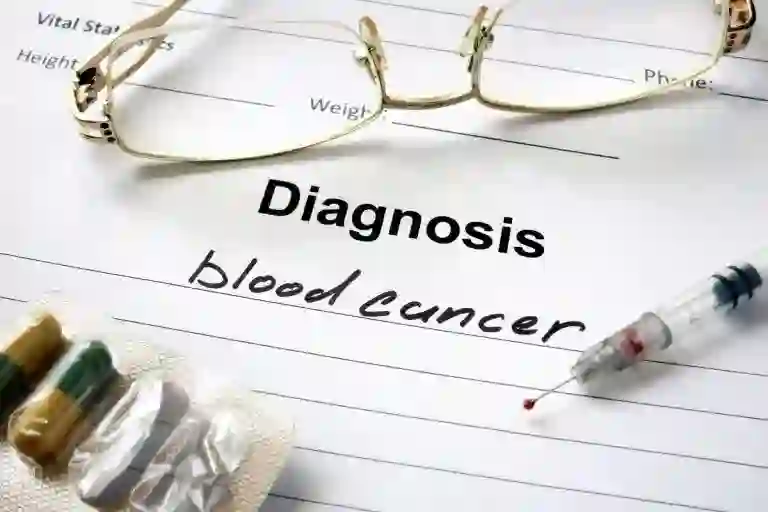
Blood cancer is a type of cancer which affects how the body produces blood cells and how well those cells work. Most blood cancers begin in the bone marrow, which is the site of blood cell production. Red blood cells are responsible for carrying oxygen around the body, while white blood cells and platelets fight off infections and control bleeding. Blood cancer can result in abnormal production of one of these blood cells, leading to various medical conditions. Blood cancer often occurs as a result of mutation in these blood cells, resulting in abnormal behaviour of these cells. Most often, what triggers such changes are not under the control of the patient or others. Blood cancer is not a hereditary disease, which means that it develops during the lifetime of a person and does not pass on to the next generation of a patient suffering from blood cancer. Children can also develop blood cancer. Symptoms and treatment of blood cancer vary between children and adults. Diagnosis of Blood Cancer Blood cancer diagnosis may be performed by a healthcare professional or doctor who may assess the physical symptoms and ask for the medical and family history of the patients. The doctor may order some blood tests as well as some imaging tests. The type of blood test may depend upon the type of blood cancer suspected. The various tests used to diagnose different blood cancers include the following: Treatment & Management of Blood Cancer Blood cancer treatment may not yield the same results for everyone. Some factors such as age, overall health condition, and specific treatment side-effects also need to be considered before considering any form of blood cancer treatment. A team of doctors discuss the appropriate treatment plan with the patient after a thorough evaluation of all factors that may interfere with the treatment. Some of the common blood cancer treatments available include the following: Chemotherapy is one of the most effective blood cancer treatments, which uses certain drugs to destroy the cancer-causing cells. Sometimes, chemotherapy may be applied along with a stem cell transplant to maximise the benefit of both treatments. Radiation therapy is beneficial for patients with lymphoma. This treatment procedure uses specific high energy beams such as X-rays, protons, or other energy beams to destroy the cancerous cells. Immunotherapy aims to fortify the patient’s own immune system to target and fight off the cancer cells by destroying them or slowing down their growth. CAR T-cell therapy is a form of immunotherapy, which harnesses the power of T-cell lymphocytes of the patient and turns it into an effective blood cancer treatment method. This treatment can be used to treat acute B-cell lymphoblastic leukaemia, multiple myeloma and a number of non-Hodgkin’s lymphomas in case other forms of blood cancer treatments have failed to work. This is an innovative blood cancer treatment procedure that targets genetic changes or mutations in the cancerous cells and destroys them so that they cannot turn normal, healthy cells into abnormal cells. When the stem cells of the patient get destroyed by cancer, they can be replaced by using new healthy stem cells either from the patient themselves or from a donor. This blood cancer surgery is another one of the most effective blood cancer treatments wherein the healthy stem cells are utilised to replace the cancer affected cells of the bone marrow. This provides the best recovery outlook for patients. Bone marrow transplant can be done in two ways: Conclusion The primary goal of blood cancer treatment is to cure the problem. If it cannot be cured, there are many ways that Oncologists may employ to achieve remission, that is, eliminating the signs and symptoms of cancer. Not everyone requires treatment for blood cancer and sometimes some patients may need to wait before treatment can be proceeded with as their cancer may be slow-growing. The best way to cure cancer is to detect it early. Get a one-on-one consultation with the top Oncologists of India at Wockhardt Hospitals, the best blood cancer hospital in India where you can avail advanced, state-of-the-art facilities for blood cancer treatment in India with utmost expertise and compassion. Book your appointment today and get a quote for blood cancer treatment cost in India. FAQs on Blood Cancer Treatment in India Q. What is Leukaemia? It is the most common blood cancer affecting the white blood cells or leukocytes. Both children and adults are affected by leukaemia. Leukaemia can be of different types, which include: Acute lymphoblastic leukaemia, Acute myeloid leukaemia, Chronic lymphocytic leukaemia Chronic myelogenous leukaemia Q. What is Lymphoma? Lymphoma is a cancer of the lymphatic system, which includes the bone marrow. There are different types of lymphoma cancer: Hodgkin lymphoma Non-hodgkin lymphoma Waldenstrom macroglobulinemia B-cell lymphoma T-cell lymphoma Follicular lymphoma Q. What is Myeloma? Myeloma is a type of cancer, which begins in the bone marrow and affects the plasma cells. Multiple myeloma, plasmacytoma, and amyloidosis are the different types of myeloma cancer.
Skin Cancer Diagnosis, Treatment & Surgery
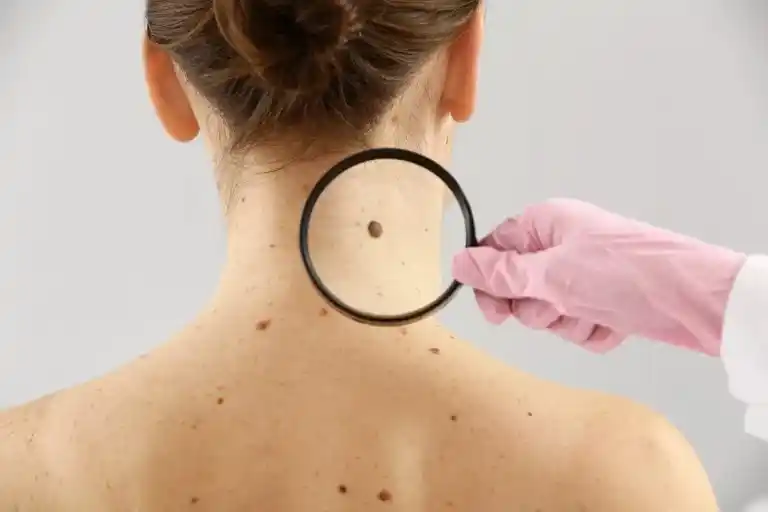
Skin cancer is a cancerous condition affecting the skin, causing new bumps or patches and changes in the size, shape, and colour of skin growths. Skin cancer is treatable; therefore, a skin cancer diagnosis can help to prevent the progression of the disease. Skin cancer treatment in India includes skin cancer surgery, chemotherapy or radiotherapy, cryotherapy, and other such cancer treatment modalities. For accurate diagnosis and treatment of skin cancer, visit the top Oncologists at Wockhardt Hospitals, the best skin cancer hospital in India. Skin Cancer Diagnosis Skin cancer diagnosis begins after observing changes or new appearance of growths and moles, unhealing scars, and scaly patches of skin. Primarily, a dermatologist examines the skin condition of the patient and also assesses the skin on other parts of the body to look for any changes elsewhere. If the doctor suspects skin cancer, they may recommend a skin biopsy for laboratory testing. The biopsy may reveal whether the skin change is cancerous as well as the stage of skin cancer. Skin Cancer Treatment Skin cancer treatment may depend on the type, location, size, and spread of skin cancer. Superficial, small-sized skin cancer may not require invasive treatment other than a simple biopsy to remove the cancerous cells. There are several treatment options available for skin cancer, including: Cryotherapy This involves freezing the cancerous skin cells, which slough off on their own after the treatment. Chemotherapy A standard cancer treatment, chemotherapy can be applied to kill cancer cells by applying medications directly on the skin (topical administration) or through pills. It may also be administered intravenously if the cancer has spread to other parts of the body. Radiation Therapy Another cancer treatment modality, radiation therapy, may be beneficial for killing skin cancer cells using radiation to prevent them from growing. Photodynamic Therapy This treatment uses a combination of laser light and drugs to destroy skin cancer cells. Excisional Surgery Skin cancer surgery may be done to remove a portion of the skin containing the diseased cells and preserve the surrounding areas as much as possible. Mohs Micrographic Surgery Alternatively known as a complete margin assessment surgery, the Mohs micrographic surgery technique is one of the common skin cancer surgery procedures which involves removing a visible tumour along with surrounding parts of the skin around the edge of the tumour. This procedure is typically performed for larger skin tumours, especially those located in the head and/or neck region, and also for recurrent cancer in the same place. Using this excisional method, each fragment of the removed skin is examined under the microscope to ensure that the entire diseased cells have been removed. Curettage & Electrodesiccation A sharp, spoon-shaped instrument known as a curette is used to remove any skin lesion and later treat the area with an electric current to destroy any remaining cancer cells and control bleeding. This process is called electrodesiccation. Wide excision This procedure involves removing a skin tumour along with the surrounding healthy cells to ensure that all the cancerous tissues are removed from the site. Apart from these surgical procedures for skin cancer, additional surgical intervention may also be required for reconstructive or adjoining organ/tissue biopsy. Sentinel Lymph Node Biopsy This surgical procedure is used to find out if cancer has spread to the lymph nodes. A sentinel node is the first lymph node into which the lymphatic system drains from the site of the tumour. If this sentinel node contains cancer cells it would entail that the cancer has spread and require further treatment, including additional surgery. Reconstructive Surgery Skin cancer often leaves a scar on the skin, which requires a reconstructive procedure as scarring and dents may affect the quality of life of a patient as well as the way they talk or eat. Reconstructive surgery may improve functionality as well as appearance. What are the Stages of Skin Cancer? The stage of skin cancer may indicate the severity of the cancer and extent to which the cancer has spread. When to See a Doctor? Any noticeable changes on the skin, the appearance of rough lesions, or changes in the shape and colour of existing moles should be checked by a doctor. Although not all skin changes result from cancer, it is better to seek medical attention promptly to avoid complications. Conclusion Nearly all skin cancers can be cured if they are detected and treated early, before they have a chance to spread. Skin cancer can also be prevented by taking precautionary measures. Any suspicious skin changes should be checked by a doctor. Schedule a one-on-one consultation with the top oncologists at the best skin cancer hospital in India – Wockhardt Hospitals, and access a comprehensive range of services for world-class skin cancer treatment in India. Book your appointment with us today. FAQs on Skin Cancer Treatment in India Q. What is the cost of skin cancer treatment in India? The average cost of skin cancer treatment in India can range anywhere between Rs. 10,000 and Rs. 2,50,000. Q. What kind of surgery is done for skin cancer? Skin cancer can be treated by electrodesiccation and curettage, Mohs surgery, or surgical excision. Q. What is the procedure for skin cancer diagnosis? Primary evaluation may include physical examination of skin growths or concerning spots or moles along with blood tests. Skin biopsy may help to confirm a diagnosis of skin cancer.
World Fertility Day: 2 November, 2024
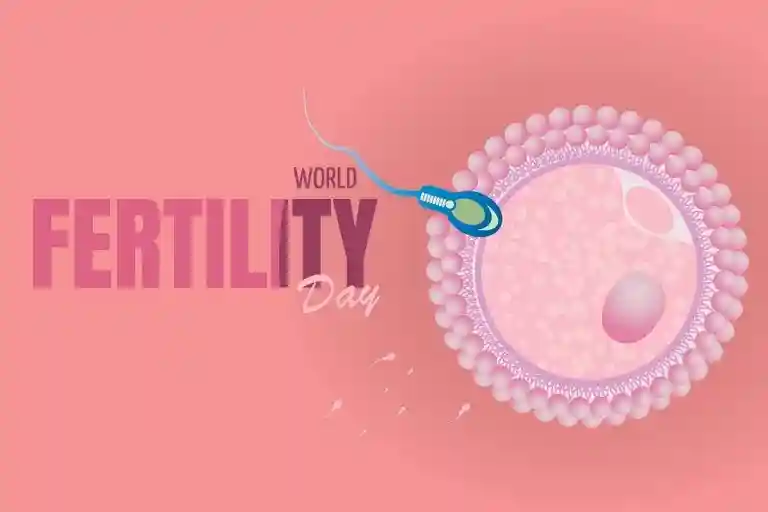
Infertility affects everyone, regardless of gender, colour, or country of origin. The International Committee for Monitoring Assisted Reproductive Technologies (ICMART) defines infertility as ‘a disease characterised by the failure to establish a clinical pregnancy after 12 months of regular, unprotected sexual intercourse or due to an impairment of a person’s capacity to reproduce either as an individual or with his/her partner.’ Infertility struggles may be perplexing and emotionally alienating. Because of this, it’s crucial to spread awareness about infertility, which is why we observe World Fertility Day. World Fertility Day is a globally recognized occasion that sheds light on the intricate web of factors surrounding fertility and emphasizes the importance of reproductive health and family planning. This annual event, hosted by IVF Babble and held on November 2nd, strives to increase knowledge of, empathy for, and support for those going through the very difficult process of conception. History of World Fertility Day IVF Babble launched the first World Fertility Day on November 2, 2018. The group was founded by Sarah and Tracy, who utilized IVF technology to have children. The group aimed to discuss their fertility issues and the difficulties they experienced during their IVF journey. With the number of infertility cases increasing rapidly, it is a growing problem nationally and worldwide. International Fertility Day provides individuals with a platform on the international stage, where annual awareness programs on topics like fertility are held. Importance of World Fertility Day World Fertility Day serves a vital role in contemporary society. It offers a platform to address issues related to fertility and reproductive health that are often brushed under the rug. Here’s why this event is of paramount importance: Awareness and Education – World Fertility Day educates individuals about fertility preservation, family planning, and reproductive health. By dispelling myths and taboos, it empowers people to make informed decisions about their fertility. Reducing Stigma – Infertility carries a significant social stigma, often causing emotional distress and isolation. World Fertility Day works to normalise conversations about infertility, providing emotional support to those affected and reducing societal judgement. Fertility Preservation – As more individuals are delaying family planning, fertility preservation becomes crucial. World Fertility Day encourages people to consider their reproductive options and plan for the future. Equality and Inclusivity – The observance promotes equal access to fertility treatments and support regardless of gender, age, sexual orientation, or socioeconomic status. It advocates for inclusivity and diversity in fertility care. World Fertility Day 2024 in India Due to India’s rich cultural and socioeconomic diversity, World Fertility Day holds particular significance for the nation. It provides an opportunity to address numerous challenges and misconceptions related to fertility and promote a holistic approach to fertility awareness in India. In India, this day is marked by various activities, seminars, and workshops aimed at educating individuals about reproductive health. Experts from the fields of medicine and psychology discuss common fertility challenges, available treatments, and the emotional aspects of infertility. Young individuals contemplating family planning choices, couples attempting to conceive, and medical experts seeking to advance their expertise often participate in these events. How Serious is Infertility? Over 180 million couples in low- and middle-income nations grapple with infertility. According to the World Health Organisation (WHO), in some societies, a girl with reproductive issues may face stigmatisation as being unmarriable and a burden on her relatives and community. Furthermore, because infertility and childlessness are considered taboo in some countries, a woman unable to conceive is likely to endure severe mental anguish. She may have to cope with social and psychological consequences, gender-based abuse, and may even be abandoned by her family if the repercussions are significant. Wockhardt Hospital – Understanding of the Importance of World Fertility Day 2024 Wockhardt Hospitals has been at the forefront of recognizing the significance of World Fertility Day. We are aware of the severe consequences that issues related to infertility may have on individuals and families. Wockhardt Hospitals is committed to providing assistance to individuals and couples experiencing difficulty in conceiving. This support goes beyond medical treatment and includes emotional and psychological support to help individuals cope with the emotional strain of infertility. We are making substantial contributions to the cause of fertility awareness and support.
National Cancer Awareness Day: 7 November, 2024
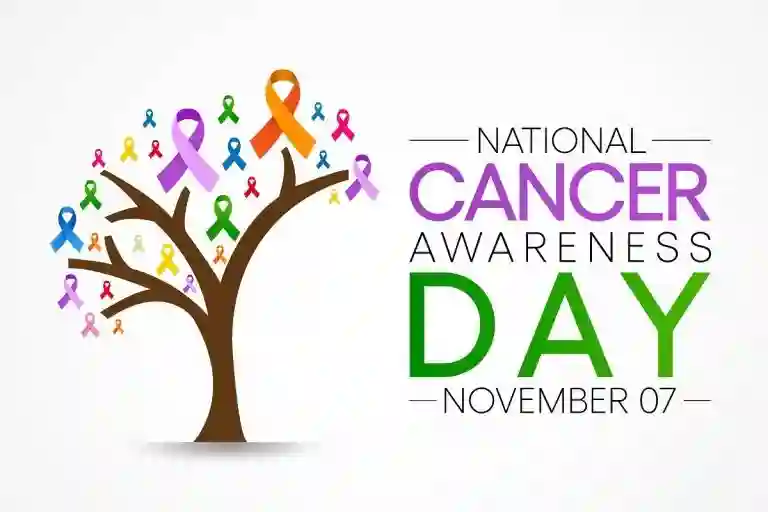
In India, November 7 is considered the National Cancer Awareness Day. It is an annual event which is dedicated to underscoring the significance of this disease and helping individuals get a better understanding of the critical aspects associated with its timely identification, effective treatment, and accurate diagnosis. According to the reports by the World Health Organization, Cancer is still a leading contributor to mortality rates in the country. In India, as many as 1.1 million new cancer cases are reported every single year, highlighting the severe burden the disease has on the nation’s healthcare system and population. A large proportion of these cancer cases are detected when the disease has already reached an advanced stage, greatly compromising the prospects of successful treatment and survival. To tackle this huge issue, several initiatives and programs have been taken up in India, with the aim to intensify research and initiatives focused on the prevention of cancer and ensuring the disease is diagnosed and treated at an early stage. These efforts are made to address the root causes, promote healthier lifestyles, and facilitate timely screenings to ensure that cancer is identified at a stage when treatments can be most effective. Ultimately, National Cancer Awareness Day is a powerful reminder of the imperative need for collective action to fight this health challenge in India and around the world. History of National Cancer Awareness Day National Cancer Awareness Day is celebrated to mark the anniversary of the renowned Nobel Prize laureate, Madame Curie. She was born in 1867, and she is celebrated for several of her groundbreaking discoveries, which have contributed immensely to the ongoing battle against cancer. Her excellent research has helped in the developments in the field of nuclear energy and the use of radiotherapy for cancer treatment. National Cancer Awareness Day, thus, serves not only as a tribute to Madame Curie but also as a reminder of the huge impact her scientific endeavours have had on our capacity to combat cancer. It is a day of recognition for her significant role in advancing the field of oncology and improving the lives of countless individuals affected by this condition. What To Do On National Cancer Awareness Day There are several ways to observe National Cancer Awareness Day. Individuals can engage in various activities on this day to enhance their understanding of the condition and combat it. Understanding the condition: Learn more about the different forms of cancer, their causes, risk factors, and how early detection can be beneficial. Patients should stay informed about the latest advancements in cancer research and treatment, as these are constantly evolving. Get screened for cancer: If your doctor has recommended a cancer screening due to suspicion of cancer, such as a mammogram or colonoscopy, use this special day as a reminder to schedule the appointment. Early detection can significantly improve the chances of successful treatment. Spread awareness about the condition: Patients can utilise social media, blogs, or organise events to share information about cancer prevention and educate others about its signs, symptoms, and the importance of regular check-ups. Encouraging friends and family to do the same is essential. Support cancer organisations: Patients or individuals interested in contributing to cancer research and treatment can make donations to organisations that support cancer research. Many organisations focus on improving cancer care and funding research related to this condition. Conclusion National Cancer Awareness Day allows people to educate themselves about this condition and support early detection or prevention of the disease. Doing your part can contribute to raising awareness of this condition.
World Prematurity Day: 17 November, 2024
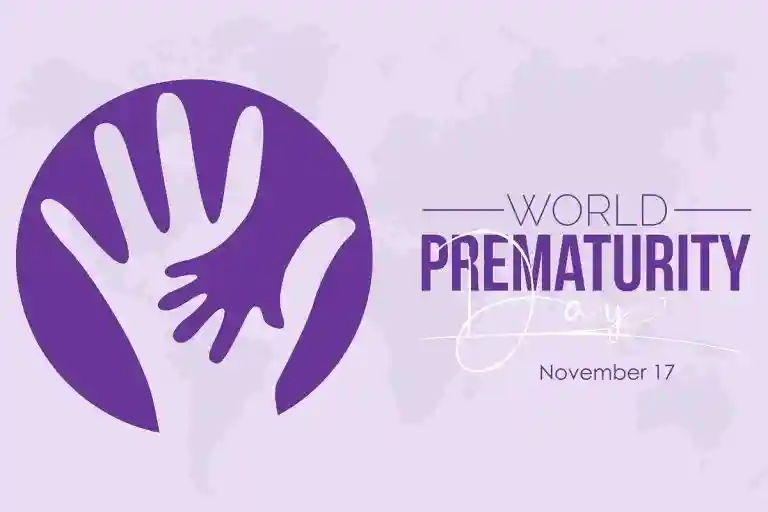
World Prematurity Day is celebrated every year on November 17 to raise awareness about the challenges faced by preterm babies and their families, as well as to demonstrate solidarity and compassion for such families. This day was commemorated by the March of Dimes in association with the Euro-NICU as World Prematurity Day to celebrate the resilience and strength of families raising preterm babies and to extend an arm of hope, love, empathy, and support to them. Babies born too early face numerous challenges in many aspects of life while growing up and require special assistance to help them grow safely. The World Prematurity Day aims to raise awareness and provide support to these tiny wonders, giving them a world of love. History Of World Prematurity Day 2024 November 17 as World Prematurity Day was coined by the March of Dimes for the first time in 2011 to raise awareness for the millions of preterm babies born worldwide. Babies born before 37 weeks of pregnancy are termed as “premature” or “preterm” babies. At such a tender stage, the organs inside the baby are not fully developed. Therefore, special care and rehabilitation are of utmost importance to support the baby in its further growth. Medical technology and research have made momentous leaps over the past few decades in addressing various health complications and conditions of growing babies from the womb to adulthood. However, babies born prematurely carry various risks and are also vulnerable to developing conditions like cerebral palsy. An estimated 1 out of 10 babies are born prematurely worldwide. Unfortunately, premature birth is one of the leading causes of death for preterm babies. World Prematurity Day 2024 Theme The global theme of World Prematurity Day 2024 is “Small actions, BIG IMPACT: Immediate skin-to-skin care for every baby everywhere.” Skin-to-skin contact has been proven to be extremely effective for every baby, especially for premature babies. Initiated right after birth, the practice of skin-to-skin contact contributes to the baby’s awareness of touch and affection, playing a pivotal role in starting and sustaining breastfeeding. Significance of World Prematurity Day 2024 World Prematurity Day 2024 celebrates the importance of skin-to-skin contact between the baby and mother, which is essential for providing loving and sensitive care for the baby, much needed for their development. The practice of skin-to-skin contact with the mother is linked to the development of emotions and memory and also favours oxytocin secretion, enhancing the bonding between mother and child. The significance of World Prematurity Day 2024 lies in raising awareness about premature birth and encouraging research and prevention methods. Awareness about preterm birth By observing World Prematurity Day, we can shed light on the importance of providing care and raising awareness about the devastating effects of premature birth on the baby, the parents, and the family of the baby. Through this day, awareness about creating better healthcare and treatment opportunities can be sought for preterm babies to improve the outcomes of medical care given to them for their growth. Reinforcing preventive measures World Prematurity Day promotes the importance of preventing and detecting chances of premature birth, as well as ensuring proactive care for the babies to reduce complications and encourage care for preterm babies by highlighting the risks associated with preterm birth. Encouraging research By observing World Prematurity Day 2024, we can promote, support, and encourage continued research. This will help in the prevention and better management and care for premature birth, as well as for making treatments readily available to deal with the consequences and complications of preterm birth. Through the contributions of organisations and volunteers from all over the world, we can accelerate the development of therapeutic care to make preemies healthier and stronger in the future. World Prematurity Day 2024 in India Despite advancements in medical sciences, the mortality rate in India remains high, with approximately 1 out of 7 preterm babies facing a grim fate. This underscores the urgent need to increase awareness about the risks associated with premature birth in India. By shedding light on the perils of premature birth for infants, we can contribute to the creation of a healthcare environment that prioritises policies aimed at safeguarding the well-being of prematurely born children. Celebrating World Prematurity Day 2024 Join us in celebrating World Prematurity Day 2024 on November 17. You can participate and support the cause in your own unique way. Consider organising an event or a march to raise awareness about the issue of prematurity, spearhead a fundraiser. You can also contribute by volunteering and donating to support the parents and families of preterm babies through reputable organisations, helping them navigate through these challenging times. If you have a personal story to share, don’t hesitate to do so within your community to enhance awareness about premature birth. Wockhardt Hospitals is dedicated to providing exceptional clinical services to both prospective parents and parents of premature infants, guiding them through the entire process of pregnancy, childbirth, and beyond. Our children are the future citizens of India, and nurturing them is our responsibility as a trusted medical care institution. On World Prematurity Day, let’s unite to amplify awareness of the pivotal role that medical care plays in ensuring successful gestation and providing expert healthcare support for mothers and babies at every stage of their lives.
Breast Cancer Awareness Month: October 2024
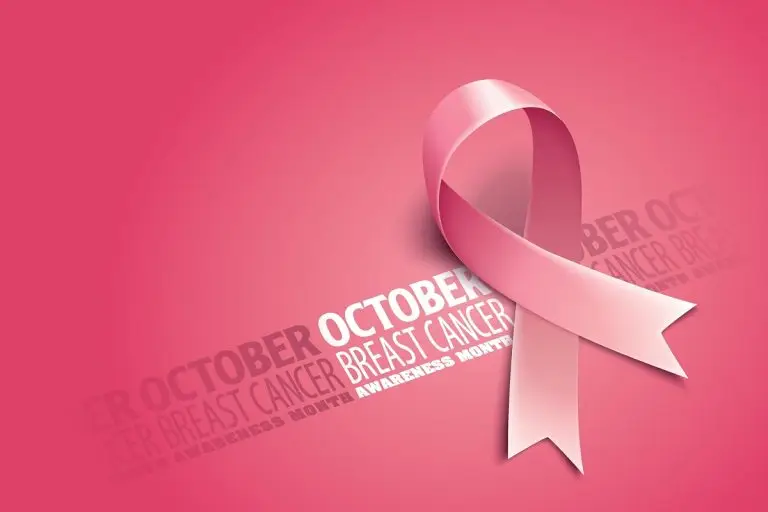
Breast cancer is a condition characterised by the uncontrolled growth of cells within the breast. It stands as the most prevalent cancer among women in India, with rates as high as 25.8 cases per 100,000 women and a mortality rate of 12.7 per 100,000 women. October has been designated as Breast Cancer Awareness Month. The objective of this month is to educate people about this condition and emphasise the significance of mammograms as the most effective method for breast cancer screening. Throughout this month, a pink theme sets the stage for various campaigns and initiatives around the world. These efforts are made by diverse groups, including breast cancer advocacy organisations and local community groups. Breast Cancer Awareness Month also significantly helps in raising funds for breast cancer research, allowing doctors to provide more accurate treatments. History of Breast Cancer Awareness Month The Breast Cancer Awareness Month was first organised by the American Cancer Society in collaboration with Imperial Chemical Industries as a week-long event. Over time, with increasing recognition and support from people, it evolved into a month-long celebration. The iconic pink ribbon associated with Breast Cancer Awareness Month was introduced in 1992. Eventually, Breast Cancer Awareness Month garnered global recognition, and organisations and individuals across the globe began to observe it. In the beginning, the primary purpose of celebrating this month mainly focused on raising awareness about the importance of early detection and mammography. Women’s health advocates, healthcare professionals, and community organisations played important roles in these early campaigns. This month-long event has turned into a global movement, bringing individuals closer in the fight against this illness. Recognise Breast Cancer Symptoms More than anything else, Breast Cancer Awareness Month is about educating oneself on the symptoms of this condition for early recognition. Additionally, having good knowledge of the symptoms can be helpful in spreading awareness about the disease and assisting others in early detection and treatment. Symptoms of breast cancer can vary among patients, but some common ones are listed below: A new mass found within the breast or underarm (armpit). The skin on the breast appears irritated or shows dimpling. An area of the breast becomes thicker or swollen. Redness or flakiness observed in the region around the nipple or on the breast. Nipple retraction or discomfort in the nipple area. Here’s What To Do This Breast Cancer Awareness Month Breast Cancer Awareness Month provides individuals with an opportunity to actively participate in the effort to combat breast cancer. There are several ways in which you can contribute to Breast Cancer Awareness Month. Educate yourself: Before anything else, it is crucial to understand breast cancer and what it entails. You can conduct research online or consult with a doctor to gain a comprehensive understanding of this illness. Get a mammogram: Getting this essential screening is incredibly important. This test aids in the early detection of the condition and facilitates timely treatment. Educate others: Spread awareness about breast cancer and how early detection can help prevent the illness from worsening. You can achieve this through social media or by participating in breast cancer awareness events. Contribute to fundraising initiatives: Be a part of and contribute to fundraising events and campaigns organised by breast cancer charities. These funds can be very helpful in breast cancer research, support programs, and patient assistance. Support patients: Engage in conversations with individuals who are dealing with breast cancer and empathise with their stories. Understand their needs and provide as much support as you can. Organise Awareness Events: You can also consider arranging your own awareness events during Breast Cancer Awareness Month, which may include fundraisers, educational sessions, community talks, and more Conclusion Breast Cancer Awareness Month is a great opportunity to raise awareness about this illness and help millions of women safeguard themselves against the complications of this condition. This Breast Cancer Awareness Month in 2024, pledge to go pink and do your part in raising awareness for this disease.
World Anaesthesia Day: 16 October, 2024
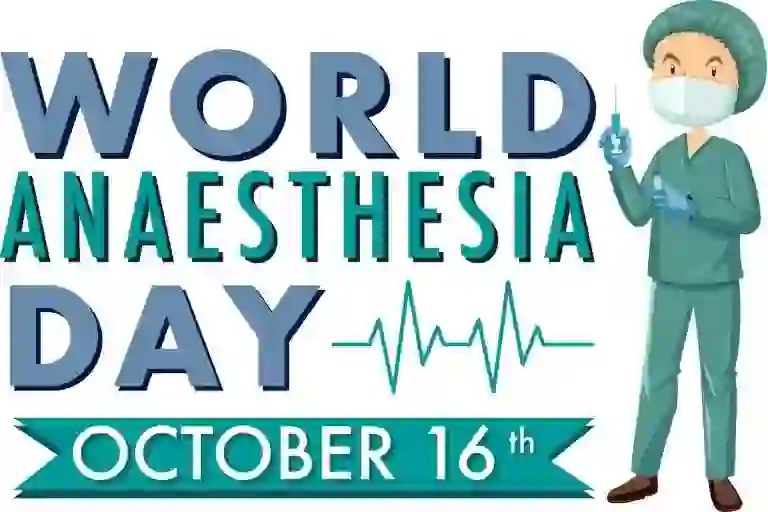
Every year, on October 16th, a global healthcare holiday known as World Anaesthesia Day is observed to raise public awareness about the importance of anaesthesia in healthcare. The day is also dedicated to celebrating the extraordinary efforts of anaesthesia specialists, often known as anaesthesiologists, who work persistently to ensure that surgical procedures are painless and safe. The relevance of anaesthesia and its critical function in contemporary medicine are highlighted on World Anaesthesia Day each year. In recognition of the first successful use of anaesthesia, several national and international organisations, hospitals, and clinics collaborate to host a variety of events on this day. History of World Anaesthesia Day World Anaesthesia Day marks a significant event in the history of medicine. The first effective test of ether as an anaesthetic was conducted by W.T.G. Morton on October 16, 173 years ago. World Anaesthesia Day is observed today in honour of this momentous occasion, which launched the discipline of anaesthesiology. His efforts paved the way for the development of modern anaesthesia techniques and transformed the medical world. The World Federation of Societies of Anaesthesiologists (WFSA) established World Anaesthesia Day. To commemorate this historic anniversary, special gatherings have been planned since 1903. World Anaesthesia Day Theme 2024 Each year, World Anaesthesia Day is celebrated with a specific theme that highlights important aspects of anaesthesia and its contributions to healthcare. The theme for World Anaesthesia Day 2024 is “Anaesthesia and Cancer Care.” This theme emphasises the significance of anaesthesia in the management of cancer. During surgical interventions and other medical treatments, anaesthesiologists play a crucial role in ensuring the safety and comfort of cancer patients. To enhance outcomes for cancer patients, the theme also calls for the expansion of anaesthesia services. Importance of World Anaesthesia Day World Anaesthesia Day holds immense significance for several reasons: Patient Safety – Anaesthesia is an essential component of modern medicine, ensuring that patients can undergo surgery and medical procedures without experiencing pain or distress. Recognising the importance of this medical specialty raises awareness of the critical role it plays in patient safety. Effective Treatment – Anaesthesia and surgical procedures are required for treatment or palliative care in about 80% of cancer patients. A smoothly integrated multidisciplinary strategy is necessary for the efficient treatment of cancer, with anaesthesia playing a crucial role that demands sufficient resources and attention. Public Awareness – By celebrating this day, the public becomes more aware of the importance of anaesthesia in healthcare. Patients gain a better understanding of the professionals responsible for their comfort during medical procedures. Global Collaboration – World Anaesthesia Day fosters a sense of unity among anaesthesia professionals worldwide. It encourages collaboration and information sharing to further enhance patient care. World Anaesthesia Day in India In India, World Anaesthesia Day is celebrated with great enthusiasm. The country has a long history in medicine, and Indian anaesthesiologists have made major contributions worldwide. The day serves as an opportunity to recognise and honour the anaesthesia professionals in India who play a crucial role in ensuring safe surgical and medical interventions. On World Anaesthesia Day, several events and activities are planned around India. Medical institutions, hospitals, and healthcare organisations often host workshops and awareness campaigns to educate both medical professionals and common citizens about the importance of anaesthesia. Wockhardt Hospitals, a leading healthcare provider in India, understands the importance of World Anaesthesia Day and the role of anaesthesia in modern medicine. The Hospitals prioritise patient safety, and their anaesthesia teams are dedicated to ensuring a painless and comfortable experience for every patient undergoing surgery or medical procedures. Wockhardt Hospitals actively participates in World Anaesthesia Day celebrations, organising various events and activities to raise awareness among healthcare professionals and the public about the significance of anaesthesia.














